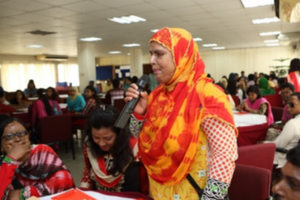

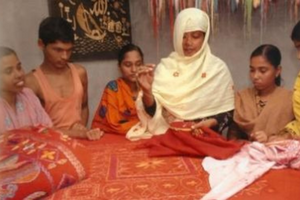
Shamima
“When I want to stand straight holding all power of the earth Suddenly my rebellious mind becomes quiet Half of my soul searches for peace My burnt soul teaches me to taste the new life”
These lines are written by a self-motivated woman who did not stop even after being acid burnt. She is constantly struggling to make many disabled women self-sufficient. Her struggle started to save her soul after being burnt with acid.
In early 1996, at the age of only 14, Shamima, a student of class eight, had to marry a 35 year old man due to family pressure. According to her family, the bridegroom’s age was not a problem as he was a service holder. However, Shamima got frightened with her husband’s extreme sexual desire right from the wedding night and after terrible three days; she came back to her father’s home. She was again sent to in-law’s house, but yet again husband’s company made her scared. Shamima’s in-laws did not consider her mental condition; rather they teased her and said she might have affair. Shamima returned her home again. Rumors were spread in her native village too. In the middle of the tag of war between the two sides, Shamima’s husband threatened her of acid attack for revenge.
It was about 2 o’clock at night on 14 September 1996. Shamima was sleeping beside a window at her father’s house. Suddenly her whole face burnt like fire. After hearing her shouting, neighbors rushed towards her and caught her acid thrower husband red handed from a nearby symmetry. Initially Shamima was brought to Kotchandpur Hospital for instant treatment, and then transferred to Khulna Hospital after 1-hour treatment in Jhinaidah hospital. Her face, eyes, ears, nose, shoulder and hands were burnt with acid. It became more severe for not using water. She was brought home after 7-day treatment at Khulna. As her condition was getting worse day by day, her father somehow collected 80 thousand taka to send her to India for better treatment in 1997. After her return from 1-month’s treatment, she had serious infection in her body. It took much time to get well by local treatment.
Afterwards, Shamima started a new life. She got admitted in class nine and started receiving sewing training. She launched an organization named Oyikko Nari Kallyan Sangstha with 43 deprived women of her village, of whom 25 were physically disabled. They are given training for block, butik and sewing. These activities are carried out through their own society (Somiti). Shamima, president of this Jubo Unnayan Adhidapter affiliated organization, is continuing her studies at Open University side-by-side her official duties. A feature on Shamima’s success was published in Prothom Alo on 17 June 2005. Till then she did not know about ASF. Photographer Shafiqul Alam Kiron, who was with the acid survivors from the beginning, read the feature and went to Shamima’s house at Jhinaidah for publishing her photograph in British American Tobacco’s Calender. He advised her to go to ASF for treatment. After a long time, Shamima took treatment at ASF. Meanwhile she had two surgeries. More operation is needed.
Shamima’s family filed a case after the acid attack. The perpetrator has been sentenced to 43 years imprisonment. He is now at jail. Shamima wants to develop her organization as voluntary organization. She wants to show how to be a protestor and self-reliant to the acid burnts as well as physically disabled women who are left behind helplessly in the society. Shamima’s self-motivated life struggle is an enlightened example to hundreds of acid victim women.
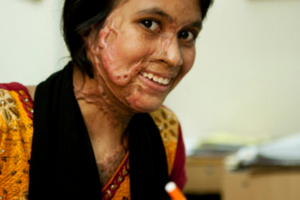
Shamima Akter
Shamima Akter a person with creativity
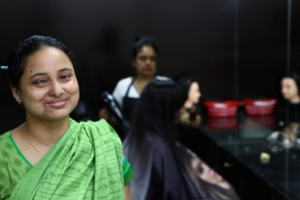
Rupali
Acid violence hardly stopped Rupali
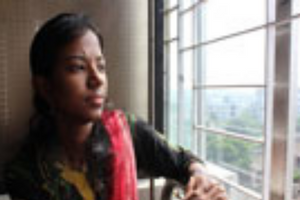
Popy Rani Das
A Flower That Will Never Die
Whether it is the best Thai cuisine in town, the roadside fuchka or simply mother’s home-cooked dinner, we all have our periodical cravings for our favorite food. Such was the case for 21-year-old Popy Rani Das, until she took a leap into the wrong direction in life. The malicious trap of marriage seized not only a little happiness that remained in Popy’s life but also her ability to eat and drink her to satisfy her taste buds. Prior to her birth, her parents had filed for a divorce and her father passed away when she was only 5 years of age. Like many other rural areas in Bangladesh, young-aged marriages have been the popular culture in Kishoreganj too. In January 2009 at the age of 21, as a medical technician at Jahirul Islam Hospital in Gazipur, Popy got married to a young goldsmith named ProdipBanik. Banik, hungry for dowry would abuse his wife day in day out. Within 8 months, their marriage had gone sour.
On September 7, 2009, Popy, who had been suffering of a severe fever, had simply requested her husband for a glass of water. The egregious acts that followed, is beyond justifiable. Taking a gulp from the glass of water that she had thought would appease her thirst and save her life had in reality been a gulp into acid that demolished her life. At consumption, an instantaneous sensation of uneasiness ran down Popy’s esophagus. Unsure of the situation and consequences, Popy gradually lost consciousness. At the news of her unconsciousness, her beloved mother and aunt did not pay much attention believing that it was simply a consequence of her fever. Only after three days had passed, her mother, overwhelmed by the realization of what had happened, took her to the Jahirul Islam Hospital, where she as an employee, received free treatment.
Soon after, she moved to the Acid Survivors Foundation where she, till date continues to receive free-of-charge treatment as well as accommodation. In dismay, Popy says, “This feeling of perpetual thirst cannot be quenched; I cannot drink water.” 1 A completely burnt throat and esophagus has left Popy to depend on mashed food provided to her through an incision made in her abdomen. Through an education initiative that ASF had taken on board after the termination of her treatment, Popy was enrolled into grade 9 under the Open University, spending a total of BDT 30, 000 as IGA support. This effort, however, became a futile attempt as a result of physician’s recommendation that Popy remains at ASF and refrained from movement due to her incision. This has also imposed a social barrier on Popy, acting as an interruption in terms of engaging in proper employment despite her expertise in sewing, handicrafts and henna art. Her excellence and talent in this field have permitted her to be serving as the trainer and instructor of the Sewing and Handicrafts training sessions for the fellow survivors, which is organized under the Income Generating Project at ASF, through the financial contributions made by the King Baudouin Foundation, a Belgium based Donor Agency.
As an artistic individual Popy has also excelled in the music and art therapy sessions that she receives at ASF. The post-incident trauma that Popy had encountered along with the additional burden of societal discrimination had made it an arduous process for her to be accepting of the situation. Nonetheless, Popy has shown a positive response to the therapy sessions and has made notable progress in terms of physical health and psychological conditions.
Marital life is often associated with affection and pleasure, yet for many individuals, such as Popy, that life has taken such a bearing on the prosperous future they could perhaps be living, that there is no turning back. Popy does not long for an opulent life; the fight for survival remains the greatest fight in her life. For further treatment it is essential for Popy to travel to Australia, however, the exorbitant costs that are entailed with her case have
acted as a hitch to further progress. As a further encumbrance to Popy’s case, a lack of prompt action by the police despite a lawsuit being filled, Banik has left to freely wander the streets, perhaps as a potential threat to many other women and a motivation to many such men.
Acid abuse cases, in regards to the failure of fulfilling dowry requirements or simply a refusal to relationship advancements, have been very common in Bangladesh. The high number of incidents like Popy’s is most remorseful, as the perpetrators are not held accountable for their sinful and heinous actions. Little to no interest on behalf of the authoritarian bodies has left this nation as an open invitation for such crimes to continue.
We the people, along with the policymakers and other authoritarian bodies of Bangladesh, must take a stand against the perpetrators and put an end to this battlefield; to make all our citizens feel protected and sheltered within the borders of their own motherland.
